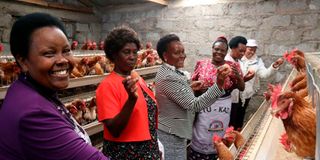Kiambu farmers engaged in poultry, pig and cattle farming eye slaughterhouse

From left: Kiambu Poultry farmers members Margaret Njeri, Anna Wambui, Fracia Thogori, Charity Mugechi, Florence Njeri and Grace Wanja at their poultry farm in Kiambu on July 11, 2022.
What you need to know:
- The group says so far it has benefitted from Sh700, 000 funding from the Uwezo Fund.
- The members grow their initiatives by rearing more chicken, pigs and cows.
- Kiambu Poultry Farmers are now considering constructing a modern slaughterhouse.
The cocktail of chicken clucks, cow moos and pig snorts at Ms Grace Njuguna’s farm in Kiambu could be noise for everybody else, but to the 64-year-old, they are proof of a successful agribusiness initiative, and an introduction into an inspiring story by a group of women in their fifties and sixties who have made a success out of farming.
A cool atmosphere and banana plants dancing to the wind welcome you to her farm, a short distance from Kiambu town, just before entering the farm’s ‘real engine’ where she is rearing at least 450 poultry and about a dozen heads of cattle and pigs.
“I have invested around Sh500, 000 in this poultry farm – I use modern equipment, which has made it easy for me to rear the chicken and also find time for my other farming engagements,” says Ms Njuguna, who worked in an insurance firm before her retirement.

Kiambu poultry farmers chairlady Charity Mugechi during the interview on July 11, 2022.
The farmer sells eggs, milk and chicken.
Her project is, however, just a snippet of what nine other members of Kiambu Poultry Farmers have at their homesteads, after forming the group back in 2012 and utilising what many small businesses in the country have had the biggest challenge benefitting from - cheap credit.
In an economy where Small and Medium-sized Enterprises (SMEs) have failed to reach their full potential due to lack of funding as banks consider the segment too risky to lend to, the group told Powering SMEs last week how, for over a decade, they have utilised Uwezo Fund, a government sponsored programme created to offer interest-free credit to groups of youth, women and People Living with Disabilities (PWDs).
Inspiring story
Talking to the women, most in their late 50s and 60s, theirs is an inspiring story of entrepreneurs who have refused to be defined by age, making the bold decision to move one step at a time as they keep dreaming bigger.

Chickens are seen at a poultry farm in Kiambu on July 11, 2022.
“When we started the group in 2012, our intention was to uplift one another financially as we develop ourselves since we were all farmers who mainly reared chicken,” recalls Ms Charity Mugechi, the group’s chairlady.
However, among the main challenges they faced was access to funding, which they needed to grow their enterprises since banks were wary of funding their kind of business.
As they sought any possible financial help, they were told of a public fund that issued groups with interest free loans.
The women recalled how they overcame fear that had engulfed many around the time and went for credit, a decision that has led to significant growth, a decade later.
“Initially, people would fear to go and ask for the loans at the constituency offices. By 2013 when Uwezo Fund was established, we had started growing ourselves. We decided to take a risk and applied for the first Wezesha loan and got Sh100,000,” Ms Mugechi recalled.

Kiambu poultry farmers members during an interview on July 11, 2022.
The money being little to benefit all 10 members, the group came up with an idea to lend the money to individual members at an interest, which would motivate members to put the funds into productive use to enable them pay back, while at the same time generating revenues for the group.
Table banking
“Once we get funding, we put the money on the table and give it to members as a loan attracting a 10 percent interest. That interest helps us grow,” Ms Mugechi says.
And the idea by the women has worked, seeing that the group has been able to buy a piece of land at a prime area in Kiambu County. The members grow their initiatives by rearing more chicken, pigs and cows and are keen to unlock more funds from the government kitty and other financial institutions.
The group says so far it has benefitted from Sh700, 000 funding from the Uwezo Fund in four batches of Sh100,000 (2013), Sh200,000 (2017), Sh400,000 (2019) and has currently applied to be funded Sh500,000, the maximum accessible, to expand their projects.
Uwezo Fund CEO, Peter Lengapiani, says that the fund had prioritised funding groups engaged in the government’s Big Four agenda to ensure that groups come up with problem-solving initiatives.
“Uwezo Fund is a government affirmative fund that was established to provide accessible and affordable credit for youth, women and people with disabilities to start or expand their businesses. The Fund has prioritised funding of groups that are directly engaged in Big Four activities. Cumulatively, 80 percent of the funding has gone to groups directly engaging in food security promoting activities, while, 20 percent has benefited groups engaged in activities that promote manufacturing and affordable housing,” Mr Lengapiani said.
Slaughterhouse
Having grown financially and skill wise over the years, the Kiambu poultry farmers are now considering constructing a modern slaughterhouse in Kiambu County to help them add value to the animals they keep before taking them to market, to maximise on returns.
“We want to have a central place where all the farmers will be taking their chicken and also buying from us. We want to add value and distribute to schools, supermarkets and other organisations,” the group’s chairperson said.

Chickens at a poultry farm in Kiambu on July 11, 2022.
To ensure that all members make reasonable returns, and in readiness for the plan, the group encourages individuals to rear at least 200 chicken and at least 20 pigs and heads of cattle.
“We have moved from those days when we used to wait for our spouses to come and do things for us. We are doing things because of the group and because of the money that we are getting,” Ms Mugechi said.
She added that regular training by professionals in the sector have enabled them find better ways to rear the animals, including options that minimise cost of rearing their animals.
Part of the challenges members face include rising cost of feeds for the animals, an issue that had at some point in the past motivated them to establish a shop that sold feeds. They explain that the price for a bag of feeds has risen from Sh3, 700 to about Sh4, 180.
The members add that due to expanding over the years, their financial needs have also grown beyond the Sh500, 000 Uwezo Fund maximum limit, calling on the government to consider raising the limit for the benefit of groups that make good use of the funds that they get.





